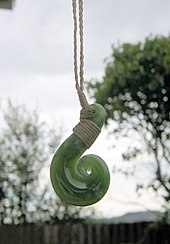Bowenite

Bowenite is a hard, compact variety of the serpentinite species antigorite (Mg3(OH)O4Si2O5).[1] Classed as a semi-precious gemstone,[2] it has been used for tools, weapons and jewellery by the Māori in New Zealand,[3][4] and for jewellery by Fabergé.[5] Deposits are found in several places around the world including Afghanistan, China, New Zealand, South Africa and the United States.[6] It typically ranges in colour from dark green to light olive green, and in shades approaching yellow.[6] Bowenite was named by James D. Dana in 1850 after George T. Bowen, who analyzed it in 1822.[citation needed]

Together with nephrite jade the Māori class bowenite as pounamu,[4] which is also known as greenstone, and is of particular significance to the Ngāi Tahu iwi on whose traditional lands on the South Island of New Zealand most deposits are found.[1] Historically it was used for tools, weapons and ornaments, although modern use is limited to jewellery, such as Tiki.[7][8][9] The South Island deposits are legally protected, and taking material without Ngāi Tahu permission has led to prosecutions.[10] In 1992 Ngāi Tahu approved the 'Pounamu Resource Management Plan' to manage deposits of this commercially valuable resource.[11]
Bowenite is the state mineral of the U.S. state of Rhode Island.[2]
Most deposits of bowenite are small,[citation needed] although a large deposit was discovered in South Africa in 1989.[citation needed] Deposits in China are in the Suzhou region, which accounts for its also being known as Suzhou jade with carving in elaborate designs.[12]
References
- ^ a b "History of minerals and coal" (PDF). New Zealand Petroleum & Minerals. Retrieved 16 April 2017.
- ^ a b "State Mineral: Bowenite". the State of Rhode Island. Retrieved 16 April 2017.
- ^ "Bowenite – a rare type of pounamu". Te Ara Encyclopedia of New Zealand. Retrieved 26 July 2024.
- ^ a b Borba, Brandon, The Cultural Significance of Maori Pounamu
- ^ "Lot 67; A Carved Bowenite Model of a Frog by FABERGÉ, CIRCA 1900". Christie's. Retrieved 16 April 2017.
- ^ a b Dietrich, R. "Serpentine". GemRocks. Retrieved 26 July 2024.
- ^ "Hei pounamu (bowenite pendant)". Museum of New Zealand Te Papa Tongarewa. Retrieved 16 April 2017.
- ^ "Bowenite – a rare type of pounamu". New Zealand Government. Retrieved 16 April 2017.
- ^ "Greenstone". A Touch of New Zealand. Archived from the original on 19 February 2019. Retrieved 16 April 2017.
- ^ "Witnesses allege greenstone theft". The Southland Times. 28 March 2008. Retrieved 21 September 2011.
- ^ "Pounamu" (PDF). Te Rūnanga o Ngāi Tahu. Retrieved 2017-04-15.
- ^ "Jade carving industry booms in Suzhou". CCTV. 25 December 2011. Archived from the original on 16 April 2017. Retrieved 16 April 2017.
